- Home
- Trevor Hoyle
Through the Eye of Time Page 14
Through the Eye of Time Read online
Page 14
‘State chronologically your movements and locations from the datum poi – from the day in question.’
‘I remained at Wolfsschanze until 20th November. Then to Berlin, where I stayed at the Chancellery until 10th December. From there I went to Adlershorst* at Bad Nauheim, and from there, on 16th January, returned to the Reich Chancellery. From there—’
‘One moment,’ Léon interrupted, ticking off the items.
There was a baleful silence.
‘Did you stay in the Chancellery itself or in the bunker?’
‘On the first occasion in the Chancellery; on the second occasion in the Führerbunker due to the fact that the Chancellery had been bombed by the Americans during the latter half of December.’
That tallies, Léon thought. Every date and location bang on the nail. Presumably it meant that the TCR circuit was functioning normally – though the dates could be accurate and yet the day by day summary of events wildly inaccurate. So was the facility functioning satisfactorily after all?
Léon tapped his fingers on the clipboard and cogitated for a moment. Although it had been explained to him more than once he had never properly understood what the mythographer was driving at. There were two conflicting series of events it seemed; very well: which was the true version and which the false? No, wait a minute – Queghan had said that neither was necessarily false – both could be true providing they were self-consistent. Now this was the part that confused him. How could two separate series of events covering the same period of time – and which clearly contradicted each other – both be accurate and true? Surely one of them had to give way in face of the other?
It was all to do with ‘probability’, he had been told, which followed as a direct consequence of Heisenberg’s Principle of Uncertainty. This stated that the position and momentum of a sub-atomic particle cannot be simultaneously determined with complete accuracy. Any conceivable method which determines the position must automatically alter the velocity of the particle; and if an attempt is made to accurately measure the momentum this again automatically affects the position. Thus the two values of a particle at a specific worldpoint can never be known with certainty.
But Léon was not, and didn’t profess to be, a physicist. He felt more at home amidst the comparatively safe disciplines of electrochemical neurology and its associated bio-electric phenomena. He understood, for example, how RECONPAN could simulate the brain patterns of someone long dead (there had been talk of using the facility to recreate Shakespeare’s brainpan and have him write another masterpiece or two) because the technique could be quantified, the specification tabulated and the circuitry set down in blueprint. He was less used to – unwilling to accept – the nebulous uncertainties of Myth Technology and the flights of fancy to which it ascended. Like Pouline deGrenier he was a pragmatist born and bred.
The next item read: ‘Personnel in Führerbunker, 22nd April–1st May, 1945, inclusive.’
Léon fed the datum point into the facility and when the panel changed from SEARCH to READY yawningly put forward his query. Back came the methodical answer:
‘Reichsjugendführer Arthur Axmann, Rittmeister Gerhard Friedrich Boldt, Chef Luftwaffenführungsstab Eckard Christian, Frau Gerda Christian, Reich Chancellor Joseph Goebbels, Frau Goebbels, Wehrmachtattaché Major Willi Johannmeier, Frau Gertraud Junge, Revieroberwachtmeister Hermann Karnau, GeneralFeldmarschall Wilhelm Keitel, SS Sturmbannführer Erich Kempka, Fräulein Else Krueger, Heinz Lorenz, Baron Major Freytag von Loringhoven, SS Hauptscharführer Erich Mansfeld, Dr Theodor Morell, Otto Willi Mueller, Heinz Matthiesing, Hilco Poppen, Flugkapitän Hanna Reitsch, SS Hauptsturmführer Guenther Schwaegermann, Baroness von Varo.’
Down the page a row of neat red ticks. Pouline would be pleased at this. She was fanatical so far as RECONPAN was concerned; indeed he wondered what else in life motivated her or brought a sparkle to her eye.
‘Certainly not sex,’ he said aloud. ‘She couldn’t be less interested.’ He bethought himself. ‘Unless it’s just me she’s not interested in.’
‘You have problems of that kind too?’ said the simulated brain of the Führer, a response generated from the electrically-charged tissue cultures and transmitted at 350 feet per second along the branches of the axon fibre, passed electrochemically through the synapse, converted from charged sodium and potassium atoms into differential wave patterns and thence via the germanium circuit to the headphones.
‘Yes,’ said Léon morosely. ‘One minute she leads me on and the next she doesn’t want to know. It’s been the same all my life. I suppose women don’t find me attractive.’
‘Is there something the matter with you? Physically?’
‘I don’t think so,’ Léon said, trying to give an honest answer. ‘I’m not handsome, I know. I’m not the kind of man women dream about; but looks aren’t everything, are they?’ He made himself more comfortable in the contoured chair. ‘To be truthful, women have always disappointed me. Even the intelligent ones like Pouline seem to be taken in by surface show. Do you know what I mean? You’d think they’d see through all that to the person underneath, the real person. I have a very loving nature, my mother always said so, but women don’t seem to find that important. Oh they say it’s important, they say they prefer a man to be gentle and considerate and understanding but they always go for the other kind, the selfish bigoted louts who treat them like dirt. I find that very confusing.’
‘I only ever loved once – the one woman.’
‘All your life?’
‘Yes.’
‘That would be Fräulein Braun.’
There was a perceptible, a significant, pause.
‘Frau Hitler.’
‘Ah yes. Yes of course.’ Léon nodded, his eyes caught and held by the winking red light. It seemed to be a time for meditative reflection, for confession even. He wished he smoked a pipe, it would have completed the image. Red lights – two of them – were glassily reflected in his wide dreamy eyes.
He said, ‘The trouble is, between you and me, I don’t like women. I mean I fancy them sexually, I’d like to sleep with the attractive ones – I’m not ambiguous in that sense – but I don’t really like them. I feel uncomfortable in their company. It’s as if I can only think of them in one way, as sexual objects, and they seem to sense this and it frightens them off. It’s only with ugly women that I can talk easily and because they’re ugly I’ve no interest in them. I can talk to Karla Ritblat but that’s only because she’s old and I don’t think of her in a sexual way at all.’
‘Ritblat,’ said the voice of the brain in his ear. ‘Is she by any chance Jewish?’
‘Not sure,’ Léon said vaguely. ‘Could be, I suppose. She prepared the tissue cultures.’
‘Explain to me.’
‘The living tissue which provides the interaction between the data-processing function in the cerebrum and the generation of conscious thought. They allow you to think.’
‘They allow me to think?’
‘Yes.’
‘And Ritblat prepared these tissue cultures?’
‘Yes.’
‘Urglhhmaaach!’
It was a sound approximating to the slow and infinitely painful strangulation of a small furry animal by barbed wire.
‘I wish you wouldn’t do that,’ Léon said, irritated. ‘It gives me a headache.’
‘What do you suppose it does to me?’ asked the brain of the Führer. ‘I have memories.’
‘Haven’t we all?’ Léon sighed.
‘Your memories are nothing compared to mine.’
‘I suppose not.’
‘Your life is nothing compared to mine.’
‘I wouldn’t go as far as that,’ Léon said, nettled. ‘Just because you’re an historical figure, somebody who made his mark, doesn’t mean to say that your life is more important than mine. Every life has its own unique significance.’
‘Scheisse!*’
‘Pardon?’
‘I said “unquestionabl
y”.’
‘You agree?’
‘I do, I do.’
‘Do you know?’ An opinion had formed in Léon’s head. ‘I think history misjudged you.’ He folded his arms and gazed at the winking red light. ‘The record files in Archives make you out to be a raving madman but you’re nothing of the sort. In fact you’re a very sympathetic person. I really feel I can talk to you, confide in you. You’re the kind of person, I should imagine, who was misunderstood.’
‘Oh I was,’ the brain of Hitler agreed readily. ‘Definitely misunderstood. History has been distorted, the truth has been suppressed and lies put in its place. Treachery and deceit and evil plots – everything which surrounded me all through my life has been allowed to pervert the true picture. I have been slandered by destiny.’
‘You had problems just like everyone else.’
‘Hundreds of problems. Insurmountable problems. Nobody knows the half of it. Except Eva and Theo.’
‘Theo?’
‘Mein Leibarzt, Dr Morell. He was one of my closest companions for many years.’
Léon consulted the list. ‘Your personal physician. Which reminds me, we never did manage to research him thoroughly for the Subject Profile. The records were incomplete. We could only feed in the barest details of his life.’
‘He was a strange man,’ the brain said. ‘Secretive. He kept a diary, I believe, though no one ever saw it. His theories on the vital forces at work within the human body were fascinating. Pity about the diary, it would have made interesting reading.’
‘It should be on file somewhere,’ Léon said, making a note. ‘I’ll have a look for it in Archives.’
‘Tell me,’ said the brain of the Führer, a note of casual inquiry in the bland emotionless voice.
‘Yes?’
‘Is this Ritblat person to be trusted? You say she developed the tissue cultures which provide me with conscious thought. There is no doubt as to her … loyalty?’
‘Karla Ritblat is a dedicated and experienced psychomedical research scientist. Are you questioning her professional integrity?’
‘You have no doubts at all?’
‘None. Why do you ask?’
The relays hummed, the red light winked. Léon listened intently to the soft simulated voice in the headphones.
‘I wouldn’t like to think that somebody of an inferior race has been tampering with the dynamic metabolism of my brain. Do not forget that I am the greatest military strategist of all time!’
*
Blanche came away from the window, saying, ‘Shaddap, ya drunken bum.’ She stood by his chair.
‘Oh my sweet Christ,’ she said, falling to her knees.
Queghan was unconscious, his eyeballs upturned into his head, saliva running freely down his chin. He was slowly choking to death with his tongue. Blanche was transfixed. In her terror and numbed panic she tore one of the arms off the teddy bear. The big dumb Polack was going to die. Right here in front of her eyes.
His limbs were rigid, the legs sticking out like wooden stilts. The neon light gave his face the appearance of a greenish death mask. His eyes were blank staring white.
She thought, I can’t let him die, he’s my husband … and then, You stupid bloody fool, the Dilantin.
For a frozen eternity of time she couldn’t remember how to get out of the apartment. Two of the doors were false, leading nowhere, and her mind refused to make a decision. When she finally moved it was with the agonizing slowness of a dream; things got in her way and hindered her and she saw her own snail-like progress from above, her mind distanced from the inept fumbling body below trying to open doors and stumbling headlong into objects. This detached part of her mind thought, If he dies because of my childish daydreams …
The syringe in the vinyl pouch was ready-charged. She extracted it carefully from the sheath, rolled up his sleeve and injected the full amount directly into the vein. His face was the colour of chalk and running with perspiration.
What next, what next, what next? She couldn’t think. He had told her, very exactly, what had to be done. Now she remembered, and reaching into his mouth uncurled his tongue, with the other hand tearing the hem off her dress and folding it into a pad and, still holding his mouth apart, pushed the wad of material between his teeth.
What if he dies? Oria thought, kneeling helplessly by the side of the chair. What if he dies?
8
The Anti-Matter Man
The CENTiNEL findings came through sooner than anyone expected, and Johann Karve was no exception. He had allowed Professor Herff and his team several weeks at the least, possibly months, before any results were obtained which could be construed as significant. Herein lay another moot point: on whose interpretation did this significance depend? Herff was in charge of the Particle Accelerator and had an established reputation as an astrophysicist but he was not familiar with the finer points of Myth Technology. It was actually up to Karve to study them, ponder their significance, and extrapolate from them meaningful conclusions.
The sheer volume of statistical data was daunting. The profusion of sub-atomic interactions at temperatures in the region of one thousand billion degrees was, to the theoreticians, somewhat embarrassing. There were charmed quarks, red quarks, black quarks, heavy leptons, neutrinos, mu-mesons, and in most instances their anti-matter companions whose life-spans were longer than the rule-book allowed by several millionths of a second.
Most disturbing of all – and yet equally intriguing – was the unmistakable presence of Hadrons, the genus of matter associated with the creation of the universe in the first micro-second after its birth. In an appendix to the report Herff had stressed that the preponderance of Hadrons in that particular spatio-temporal co-ordinate might be due to the proximity of 2U0525-06 whose time dilation interference would have an effect on the structure and behaviour of sub-atomic particles. In other words the Black Hole, in slowing time and light to a dead stop, made a mockery of earthbound physics and the premises on which scientists based their hypotheses.
Herff had written: ‘There is no disputing that Hadrons are here in force. I draw no conclusions from this fact, I simply state it. Perhaps you and mythographer Queghan might care to speculate on the whys and wherefores and the probable consequences.’
Was there a flippant irony between the lines? In his lonely outpost on the Tempus satellite it would be understandable if Max had a jaundiced view of the prima donnas back on Earth IVn who whiled away the hours chasing exotic multi-coloured butterflies in cloud-cuckoo-land. And yet, and yet … the explanation was here if only he had the wit to find it; with Queghan out of the running it looked as though the task had settled squarely on his ageing shoulders.
Karve pressed the intercom tab and asked for a pot of tea. A feeling of bleak desolation descended upon him: I have to begin all over again, he thought, and there is no one to help me. Does it never end? Do we just go on and on, solving one problem only to be faced by ten more? Yet why should this depress me when my entire life has been dedicated to this singular purpose? We shall never answer all the questions because the ultimate question will always remain: What Next?
As a young man Johann Karve had sought to reconcile the four prime energy sources with the psychic processes which manifested themselves through the human mind. A complementary sphere of scientific inquiry – MetaPsychical Research – had to a large extent taken over this work, its objective being to integrate all psi phenomena and neurochemical data into the one cohesive structure. Thereafter Karve had concerned himself more with symbolism and mythology as concentrated expressions of the roots of human psyche. His inspiration in those early days had been Carl Gustav Jung, the Swiss psychiatrist who in the early-Twentieth Pre-Colonization had laid the foundation for what was to become, many centuries later, the metaphysical science known as Myth Technology. Jung, in fact, had been the first ‘Myth Technologist’, seeking to interpret signs and omens in terms relevant to the wellsprings of psychic energy (the ‘libido’ to use the
Jungian term).
The very real basis of the science was contained in Jung’s writings: ‘Symbols are never devised consciously but are always produced out of the unconscious by way of revelation or intuition.’ In the same way dream-images, visions, extrasensory perception and myths were the concentrated manifestations of subjective experience. As he wrote elsewhere: ‘We are forced to view the world as a psychic phenomenon. Certainly it is necessary for science to know how things are “in themselves”, but even science cannot escape the psychological conditions of knowledge.’
Distant as it may have seemed at first glance it was only a short step from this study of the dynamics of the psyche to the theories advanced by the relativitists and quantum physicists – for they too were dealing in the statistical probabilities of reality as opposed to hard-and-fast criteria in a mechanistic universe.
‘The philosophical principle that underlies our conception of natural law is causality,’ Jung wrote. ‘But if the connection between cause and effect turns out to be only statistically valid and only relatively true, then the causal principle is only of relative use for explaining natural processes and therefore presupposes the existence of one or more other factors which would be necessary for an explanation. This is as much to say that the connection of events may in certain circumstances be other than causal, and requires another principle of explanation …’
So there, thought Karve, was a possible solution if one was prepared to accept it. Not that the acausal nature of spacetime was a new or original concept: mathematical evidence supported by laboratory experiment had provided the phenomenon with a respectable pedigree – notably the Ernst–Ryan–Gathorne Experiment* – and it was now taught as a supplementary subject to students of high-energy particle physics.
But was he going to be so intellectually outlandish as to suggest that Hadrons from 14 billion years ago were meddling with causality and creating ‘psi worlds’ – mythical planes of existence on which alternative scenarios were taking place? The two questions which immediately presented themselves were How and Why?

 Vail
Vail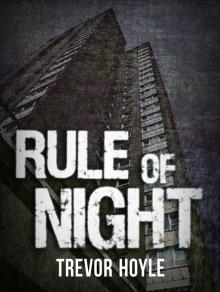 Rule of Night
Rule of Night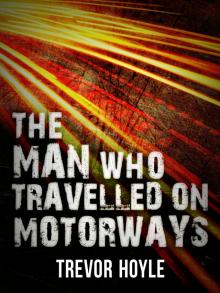 The Man Who Travelled on Motorways
The Man Who Travelled on Motorways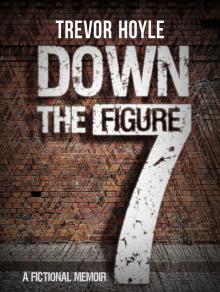 Down the Figure 7
Down the Figure 7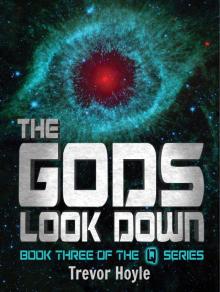 The Gods Look Down
The Gods Look Down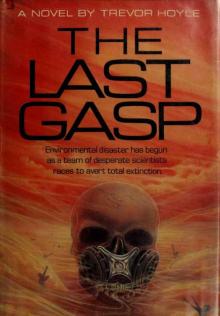 Last Gasp
Last Gasp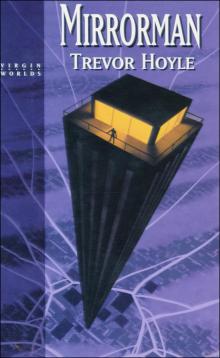 Mirrorman
Mirrorman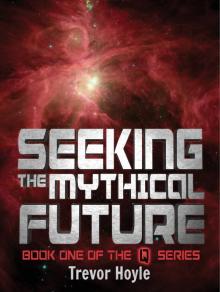 Seeking the Mythical Future
Seeking the Mythical Future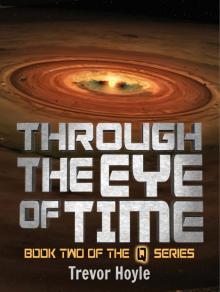 Through the Eye of Time
Through the Eye of Time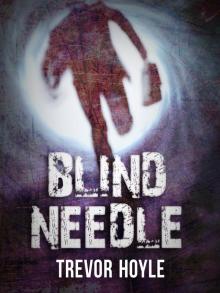 Blind Needle
Blind Needle Earth Cult
Earth Cult